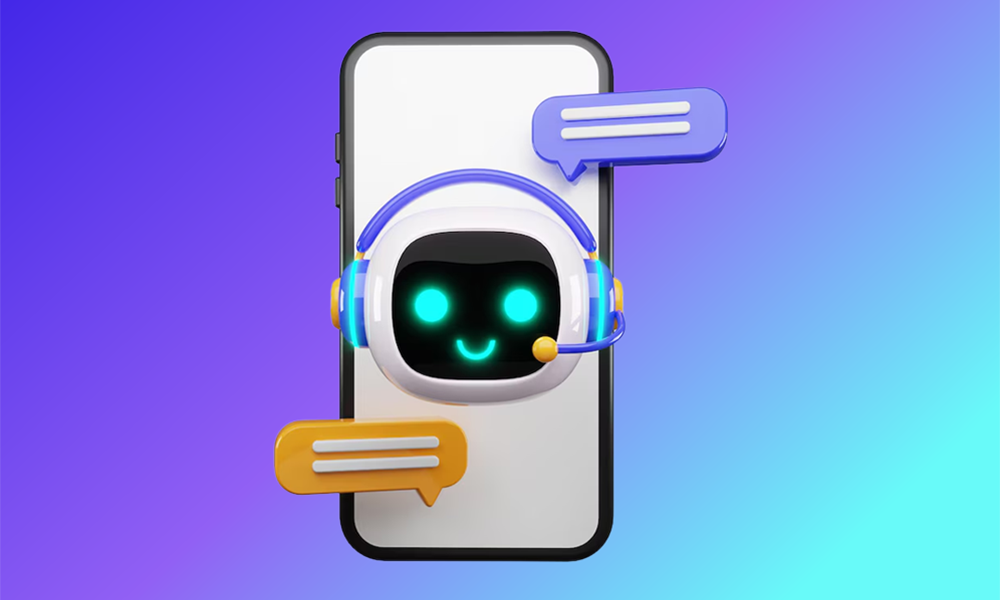
AI has changed a lot during the last 5 years, and by 2025, AI chatbots are no longer just text-based assistants – they’re intelligent, multimodal, and deeply integrated into our daily lives.
You can find an AI for everything now – it could be a productivity booster, a coding assistant, or even an AI companion. This year’s chatbots offer unprecedented capabilities.
After spending six months rigorously testing every major AI assistant on the market, I’m ready to share the most comprehensive look at what these systems can really do. In this in-depth review, we’ll explore the 7 most advanced AI chatbots of 2025, examining their strengths, weaknesses, and unique features.
By the end, you’ll know exactly which AI suits your needs – wheter for work, creativity or everyday tasks.
1. OpenAI’s GPT-5
When I first sat down with GPT-5, I planned to test it for an hour. Six hours later, I was still discovering new capabilities. This isn’t just an incremental upgrade – it’s a fundamental shift in what conversational AI can do.
The memory system represents the biggest leap forward. Where previous models would forget context after a few exchanges, GPT-5 maintains coherent conversations spanning days or even weeks. During testing, it remembered specific details about my work projects and personal preferences that I’d mentioned in passing weeks earlier.
Multimodal processing works shockingly well. For creative professionals, the new narrative tools are game-changing. But despite OpenAI’s claims about accuracy, I still caught GPT-5 confidently stating incorrect facts about recent events. The web search implementation feels like an afterthought compared to dedicated search engines, often returning outdated information.
Pros:
- Exceptional memory and contextual understanding
- Strong creative writing and reasoning
- Plugin ecosystem for extended functionality
Cons:
- Expensive – $200/month for full access
- Occasional factual inaccuracies
2. Google Gemini Ultra
After years of watching Google play catch-up in AI, Gemini Ultra finally delivers on the promise of truly intelligent workplace assistance. It’s not just helpful – it’s actively transformative for team workflows.
The real-time collaboration features redefine what’s possible. During a live document editing session with my team, Gemini Ultra suggested more concise phrasing for our proposal, relevant data to strengthen our arguments, and alternative section structures – all while maintaining our established brand voice.
The creative limitations became apparent when we asked for marketing copy. While technically competent, the output lacked originality and tended toward generic corporate speak. Our team ended up using it for draft frameworks that humans then enhanced.
There’s also a noticeable Google bias in some responses. When asked to compare cloud services, it subtly emphasized GCP’s advantages while downplaying competitors’ strengths.
Pros:
- Seamless Google Workspace integration
- Best for data analysis and real-time collaboration
- Strong fact-checking and search capabilities
Cons:
- Less creative for storytelling or humor
- Locked into Google’s ecosystem
3. xAI’s Grok-2
Grok-2 is like the opinionated friend who always says what everyone else is thinking but won’t say out loud. After extensive testing, I can confirm this is the most personality-driven AI available today.
The real-time X integration provides a unique advantage. During breaking news events, Grok often had insights minutes before traditional media. When a major tech outage occurred during my testing, Grok synthesized user reports into a coherent timeline faster than any news site.
The Based Mode delivers refreshingly direct answers. Ask other AIs about controversial topics and you’ll get milquetoast responses. Grok will give you actual opinions – sometimes too many of them.
For certain technical explanations, Grok’s simple analogies work better than more academic AIs. When I asked it to explain quantum computing to a 10-year-old, the explanation was both accurate and genuinely understandable.
Pros:
- Uncensored, opinionated, and humorous
- Free for X Premium+ subscribers
Cons:
- Unreliable for facts or professional use
- Can be offensive or biased
- Limited features outside social media
4. Anthropic’s Claude 4
Claude 4 feels like consulting with a meticulous scholar. It won’t entertain you with clever wordplay, but when you need reliable information, nothing else comes close.
The document analysis capabilities are extraordinary. I fed Claude a 300-page academic monograph, and it generated a perfect chapter-by-chapter summary, identified all key arguments, found subtle contradictions between sections, and suggested additional relevant readings.
For legal and medical queries, Claude’s cautious approach is reassuring, but the creativity limitations are real. When asked to help write a novel chapter, the prose was grammatically perfect but emotionally flat. Character dialogue felt stilted and predictable.
The refusal to engage with certain topics can be frustrating. Even when asked purely academic questions about controversial subjects, Claude often defaulted to “I can’t assist with that.”
Pros:
- Most accurate and ethical AI (minimal hallucinations)
- Handles long documents
- Free tier available
- Ideal for legal/research work
Cons:
- Overly cautious (avoids controversial topics)
- Dull personality for creative tasks
- Slower response times for complex queries
5. Microsoft Copilot
Microsoft’s deep integration of AI across its ecosystem creates a uniquely powerful tool for certain professional contexts. After months of daily use, I’ve found it transforms development workflows.
The VS Code integration alone justifies the cost for developers. In testing, it debugged complex React component issues, explained obscure error messages in plain terms, suggested performance optimizations, and generated complete API documentation.
For Office users, Excel functionality is magical. It can analyze complex datasets, suggest improvements to models and automate repetitive tasks.
Outside Microsoft’s ecosystem, functionality drops sharply. The general knowledge capabilities lag behind GPT-5 and Claude, and the creative writing is painfully corporate. Marketing copy suggestions read like they came from a 1990s business manual.
Pros:
- Best for developers because of VS Code integration
- Supercharges Office apps
- Free with Windows 12 Pro
Cons:
- Weak outside Microsoft’s ecosystem
- Generic creative writing
- Requires Windows for full features
6. Meta AI
Meta’s AI offering surprised me with how seamlessly it integrates across Instagram, WhatsApp, and Facebook. It’s the best AI for content creators and social media managers.
During my testing, it became clear this isn’t just another chatbot – it’s a content creation toolkit disguised as an AI assistant. The image generation tools are shockingly good for a free product. I created 45+ high-quality social media posts in one afternoon. It can also create consistent character designs for a storyboard project.
The video animation feature, while limited, worked better than expected. Converting still images into 3-5 second clips was particularly useful for Instagram Stories. The animate this photo function produced surprisingly smooth results about 70% of the time.
Having the AI accessible across Meta’s platforms is a game-changer. In WhatsApp groups, it can settle debates with quick fact checks, suggest meeting times by reading the chat context, and generate shareable summaries of long conversations.
The creative outputs lack refinement. While great for social content, the writing style is too casual for professional use. I wouldn’t trust it for business communications, technical documentation, and academic writing.
Pros:
- Free image/video generation tools
- Built into WhatsApp, Instagram, and Facebook
Cons:
- Limited knowledge base
- Mediocre writing quality
- No API for developers
7. DeepSeek-V3
DeepSeek continues to impress with its fully open-source model that somehow keeps pace with corporate offerings. After running local instances on three different machines, I’m convinced this is the best option for those who want complete control over their AI.
The 128k context window handles massive documents flawlessly. I tested it with entire programming textbooks (PDFs), 100+ page legal contracts, and complete codebases for analysis.
The general knowledge base isn’t as comprehensive as GPT-5 or Gemini. When testing some factual queries returned “I don’t know,” while others gave answers, and technical explanations occasionally lacked depth,
I rebuilt a small SaaS application using DeepSeek as my primary assistant. It generated 80% of the boilerplate code, documented all API endpoints, created deployment scripts, and produced user manuals, so the entire project took 40% less time than traditional development.
Pros:
- Fully open-source and privacy-focused
- Handles long codebases/documents
- Free to use and modify
Cons:
- Less polished than corporate AIs
- Smaller knowledge base
- Requires technical skill for local setups
Final Thoughts
The most surprising finding from months of testing?
There’s no single best AI – each is great in different contexts. GPT-5 offers the most complete general intelligence, but costs premium prices. Gemini Ultra transforms team productivity but requires Google ecosystem buy-in. Claude provides unparalleled reliability for research but lacks creativity.
For most professionals, I recommend choosing based on your specific needs rather than chasing the most advanced model. The AIs are moving so fast that today’s leader might be surpassed in months – what matters most is finding tools that solve your actual problem today.
All these systems work best as collaborators rather than replacements. The most effective users combine AI capabilities with human judgment, creativity, and oversight. Used wisely, these tools can amplify our capabilities in remarkable ways – but they still can’t replace thoughtful human expertise.
If you want to build an AI, reach out to The Apptitude at (512) 885-0379 – drop us a text and book a FREE consultation call.
The team will listen to your idea and come up with a perfect plan for your project, so you can just sit back, relax and watch your AI come to life.

